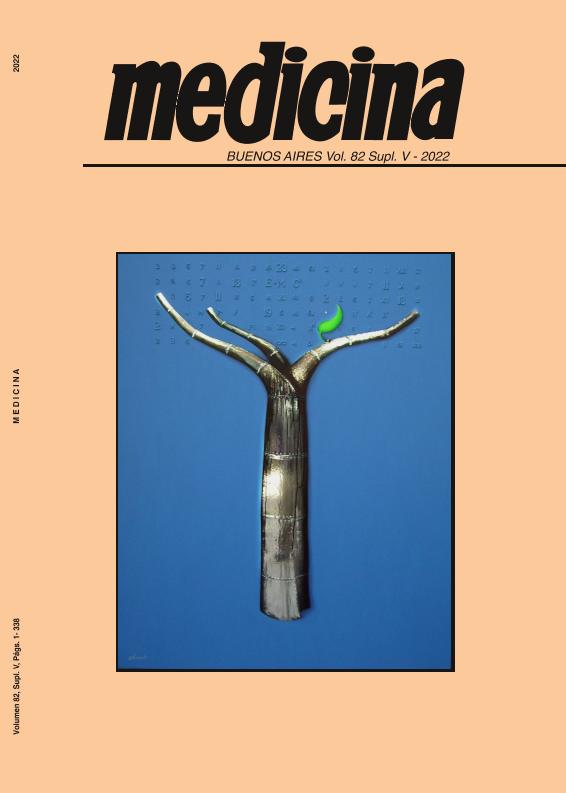Evento
Hemoxygenase-1 genetic variants effects on breast cancer progression
Schweitzer, Karen ; Alonso, Exequiel Gonzalo
; Alonso, Exequiel Gonzalo ; Mascaró, Marilina
; Mascaró, Marilina ; Fernández Chávez, Lucía
; Fernández Chávez, Lucía ; Colo, Georgina Pamela
; Colo, Georgina Pamela ; Alonso, Eliana Noelia
; Alonso, Eliana Noelia ; Ferronato, María Julia
; Ferronato, María Julia ; Fermento, María Eugenia
; Fermento, María Eugenia ; Curino, Alejandro Carlos
; Curino, Alejandro Carlos ; Facchinetti, Maria Marta
; Facchinetti, Maria Marta
 ; Alonso, Exequiel Gonzalo
; Alonso, Exequiel Gonzalo ; Mascaró, Marilina
; Mascaró, Marilina ; Fernández Chávez, Lucía
; Fernández Chávez, Lucía ; Colo, Georgina Pamela
; Colo, Georgina Pamela ; Alonso, Eliana Noelia
; Alonso, Eliana Noelia ; Ferronato, María Julia
; Ferronato, María Julia ; Fermento, María Eugenia
; Fermento, María Eugenia ; Curino, Alejandro Carlos
; Curino, Alejandro Carlos ; Facchinetti, Maria Marta
; Facchinetti, Maria Marta
Colaboradores:
Alonso, Daniel Fernando ; Malchiodi, Emilio Luis
; Malchiodi, Emilio Luis ; Vila Petroff, Martin Gerarde
; Vila Petroff, Martin Gerarde ; Lamb, Caroline Ana
; Lamb, Caroline Ana
 ; Malchiodi, Emilio Luis
; Malchiodi, Emilio Luis ; Vila Petroff, Martin Gerarde
; Vila Petroff, Martin Gerarde ; Lamb, Caroline Ana
; Lamb, Caroline Ana
Tipo del evento:
Reunión
Nombre del evento:
LXVII Reunión Anual de la Sociedad Argentina de Investigación Clínica; LXX Reunión Anual de la Sociedad Argentina de Inmunología & 3er Congreso Franco Argentino de Inmunología y Reunión Anual 2022 de la Sociedad Argentina de Fisiología
Fecha del evento:
16/11/2022
Institución Organizadora:
Sociedad Argentina de Investigación Clínica;
Sociedad Argentina de Inmunología;
Sociedad Argentina de Fisiología;
Título de la revista:
Medicina (Buenos Aires)
Editorial:
Fundación Revista Medicina
ISSN:
0025-7680
e-ISSN:
1669-9106
Idioma:
Inglés
Clasificación temática:
Resumen
Hemoxygenase-1 (HO-1) is a microsomal enzyme that catalyzes the degradation of the heme group, and its C-terminal truncated form can translocate to the nucleus and perform functions at the transcrip- tional level. Our laboratory has already shown that HO-1 has antitumoral effects in breast cancer. We have additionally confirmed that the HO-1 truncated form is not enzymatically active. The aim of this work was to study the effect of genetic overexpression of HO-1 vari- ants (full-length form (FL), full-length form without enzymatic activity (H25A) and nuclear truncated form (T-HO1)) on cellular processes related to cancer development, and also the molecular mechanisms through which HO-1 would modulate the cellular processes investi- gated. To accomplish this goal, we used T47D human breast cancer cell line that was stably transfected with plasmids overexpressing HO-1 variants. To analyse cell behaviour between variants, we per- formed viability assays and flow cytometry, and to quantify differen- tial protein expression we used immunofluorescence and western blot. We observed significant differences in cell viability between wild-type T47D cells and T47D cells overexpressing HO-1 variants. We found that the wild-type form is more proliferative than the FL-, H25A- and T-HO1-overexpressing forms (p<0.05, two-way ANOVA). We also observed that in H25A-overexpressing cells this behaviour results, in part, from an increase in cell death (p<0.05, two-way ANOVA). Finally, by immunofluorescence, we observed differences in the number of actin filopodia. So far, these results indicate that the overexpression of HO-1 FL seems to display an anti-tumor role. The behaviour of the H25A and the T-HO1 forms would indicate that the anti-tumor behaviour is the result of HO-1 enzymatic activity and its nuclear role. Future experiments will allow us to understand the role of the different pathways involved between HO-1 variants
Palabras clave:
HEMEOXYGENASE-1
,
BREAST CANCER
,
GENETIC VARIANTS
Archivos asociados
Licencia
Identificadores
Colecciones
Eventos(INIBIBB)
Eventos de INST.DE INVEST.BIOQUIMICAS BAHIA BLANCA (I)
Eventos de INST.DE INVEST.BIOQUIMICAS BAHIA BLANCA (I)
Citación
Hemoxygenase-1 genetic variants effects on breast cancer progression; LXVII Reunión Anual de la Sociedad Argentina de Investigación Clínica; LXX Reunión Anual de la Sociedad Argentina de Inmunología & 3er Congreso Franco Argentino de Inmunología y Reunión Anual 2022 de la Sociedad Argentina de Fisiología; Mar del Plata; Argentina; 2022; 265-265
Compartir



